Meet The Shortlist for the 2020 �鶹������ҳ��� National Short Story Award
Caleb Azumah Nelson
Caleb Azumah Nelson is a 26-year-old British-Ghanaian writer and photographer living in South East London. ‘Pray’ is a ‘vibrant, invigorating and agile’ story set over a summer in South East London. Charged with ‘wit, anger, affection and sorrow’, the story shows the reality for young black men navigating a world that ‘wasn’t built with us in mind’. With characters and dialogue so alive they reach out from the page, ‘Pray’ explores fear, injustice, masculinity, race and the origins of violence. Caleb’s eagerly anticipated debut novel 'Open Water' recently sold in a nine-way auction and publishes in February 2021.
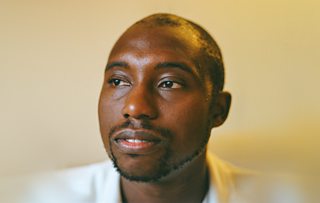
The past year has been transformative for Azumah Nelson, who left his job in May 2019 to dedicate his time to writing. 'I quit my job on faith, knowing that I had stories to tell and now was the time to tell them. I quit my job knowing that there are not many writers who look like me – a young black man – but I couldn’t let this deter me. Being shortlisted feels like even more validation that this decision was the right one and I’m glad to have found a home for this story with this prize.'
Azumah Nelson says of ‘Pray’, 'This story was an opportunity to explore what grief can look like, both individual and collective. How to be black is to mourn the loss of self; it is to be coded as threatening, dangerous, criminal; it is to have the have one’s individuality scrubbed in favour of an unnuanced view of blackness.'
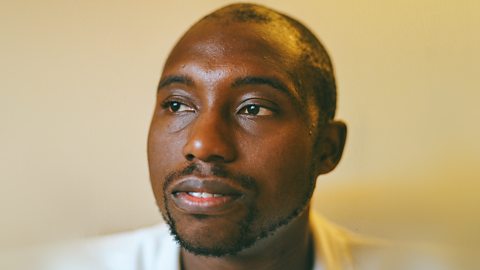
Pray by Caleb Azumah Nelson
Ben Bailey Smith reads this powerful, poetic parable about loss, longing and brotherhood
"This story was an opportunity to explore what grief can look like. How to be black is to mourn the loss of self..."
His story has been brought into even sharper focus owing to recent events. 'Premature death awaits many and takes many forms, be it physical, psychological or emotional. If the past few months have shown anything, it is that black life is not sacred, with Covid-19 and several waves of police violence.'
Jan Carson
Jan Carson is a writer and community arts facilitator based in East Belfast. The winner of the EU Prize for Literature for Ireland 2019, she is shortlisted for her ‘tender, humane and sharply observed’ story ‘In The Car With the Rain Coming Down’. Inspired by her upbringing in rural, Protestant Northern Ireland, she takes both her characters and readers on a literal and emotional journey, weaving together family politics and community rivalries as a family set off on an ill-fated picnic. Tender, nuanced and funny, it will resonate with anyone who is part of an extended family.
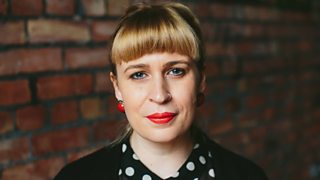
Carson says, 'It’s a huge honour to be shortlisted for this prize. I faithfully listen in to the shortlisted stories every year and can’t believe that my story will be included this year.'
'I’m also really proud to see a short story so grounded in Northern Irish culture showcased in front of a wider UK audience. The story draws upon my own experiences of growing up in a rural, Protestant Northern Irish community. When writing the story I was interested in using the close confines of the car to exaggerate and intensify the complicated interpersonal politics taking place within a family.'
Carson explains that she tends to avoid centralising sectarianism or The Troubles in her writing set in contemporary Northern Ireland, 'I am more comfortable, as in this story, addressing the complex and often nuanced issues at work in our community which have played their part in creating an environment where sectarianism and bigotry has often flourished.'
“I’m really proud to see a short story so grounded in Northern Irish culture showcased in front of a wider UK audience.”
Carson admits she finds writing short stories particularly challenging, but ultimately satisfying. 'A good short story is holy. It’s often difficult to say exactly why it has gripped you. You can’t point to a single line, a plot device or structural concept which makes it work. The whole thing has to sing from start to finish.'
Sarah Hall
Sarah Hall was born in Cumbria in 1974 and now lives in Norwich. Twice nominated for the Booker prize, with 'The Electric Michelangelo' in 2004 and 'How to Paint a Dead Man' in 2008, she is the author of five novels and three short story collections. This is the fourth time Hall has appeared on the �鶹������ҳ��� NSSA shortlist, and she won the prize in 2013 with 'Mrs Fox'.

‘The Grotesques’ is the ‘brilliantly observed and layered story’ of a young woman’s birthday gathering. Set against the backdrop of privilege and inequality in a university town, it explores themes of toxic mother-child relationships, covert control, scapegoating, and the masks we can wear to either challenge or conform to our place in society.
On her shortlisting, Hall says, 'It feels completely wonderful. The judging panel is so strong, with experts on the form, and I know the process is usually very vigorous, so I feel completely honoured to be on the shortlist and excited to hear who else has been selected.'
‘The Grotesques’ was inspired by Hall’s interest in families, societies and parenting. 'I’m also interested in scapegoating, covert control, how and why it happens. And, of course, identity - who we believe ourselves to be, and how we define ourselves, individuation versus society. I’m a mother, so that particular role and responsibility is very interesting and sometimes vexing.'
"For me, stories seem like a homecoming..."
For Hall, short story writing is particularly demanding. 'It’s harder than novel writing but more satisfying when/if the results are better forged. For me, stories seem like a homecoming, they suit what I’m trying to do, and the elements of disquiet and irresolution that I like working with.'
Jack Houston
Jack Houston is a writer from London. As a poet, he has been shortlisted for the Basil Bunting and Keats-Shelley Prizes. He has been shortlisted for the �鶹������ҳ��� NSSA with his ‘uncompromising, compelling’ ‘Come Down Heavy’, inspired by his own experiences.
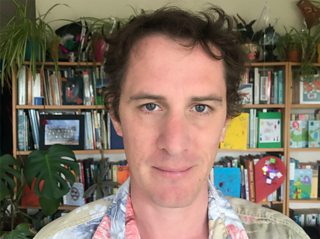
Echoes of Kae Tempest and Irvine Welsh imbue the prose-poetry of his ‘breathless’ piece 'Come Down Heavy' – a spiralling, unsettling and disorientating story of two women’s seemingly unstoppable descent into a world on the fringes of society; a world of poverty, violence, addiction and despair.
Houston says he was surprised to make it to the shortlist, 'As this will be one of my first published short stories, it feels a bit like a case of mistaken identity.'
‘Come Down Heavy’ is influenced by Houston’s own life: 'It is largely based on my own experience and that of friends.'
'Formally the piece owes a debt to the writing of Laszlo Krasznahorkai, whose 'Seibo There Below', my late brother-in-law gave me as a Christmas present. Thematically I was influenced by reading William Burroughs and Irvine Welsh at was, looking back, probably too young an age.'
“I like the short story’s ability to produce a character that can be met, and lived with, in such a short space."
Best known for writing in the poetic form, Houston says of the short story, 'I like the short story’s ability to produce a character that can be met, and lived with, in such a short space. Also its use of narrative and plot without being too beholden to them.'
Eley Williams
Eley Williams lives in London, and is a Creative Writing Lecturer at Royal Holloway and winner of the James Tait Black Prize. She is shortlisted for her surreal and succinct ‘Scrimshaw’. A ‘fresh, funny’ take on millennial relationships and the perils of modern smartphone communication, this ‘taut tale’ told via a late-night text session and inspired by the ‘literary nonsense’ of Edward Lear and Ivor Cutler, explores self-censorship, anxiety, attraction and the boundaries of language.
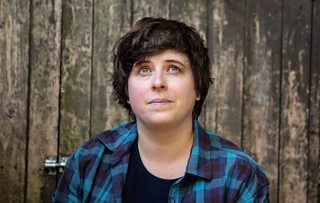
Of her shortlisting, Williams says, 'I feel extraordinary lucky. I had left the submission to the last minute, dithering over some potential edits or redrafts, and basically talking myself out of any kind of confidence. I'm so glad that I pressed that 'Send' button, and I am thrilled to appear on this shortlist.'
Williams says her story was influenced by ideas of imperfect communication. 'I had been considering the myriad ways by which we often say very little at all: either through diffidence, garbling confusion, censorship, lack of security, inability, lack of desire or because we are distracted. I was also interested in notions of anxiety and tentativeness that come with 'drafting', both in terms of creative work but also conversation or dialogue. How do you communicate anxiety, or an inability to express yourself clearly or well when your only material is sometimes-faulty language? Is language ever enough?'
“I had been considering the myriad ways by which we often say very little at all..."
For Williams, the short story has particular virtues. 'A short story permits a moment to become momentous: I believe that one can convey characterization, tension, development, suspension of disbelief through the short story through sprightly language, and that they can be used best to convey sly glimpses, flashes of inspiration with resonance.'
Subscribe to the Short Story podcast to hear all five shortlisted stories from 14th - 18th September, or listen on �鶹������ҳ��� Radio 4 from 15:30 every day.
You can also hear interviews with the shortlisted writers on �鶹������ҳ��� Radio 4's Front Row from 14th September.
The announcement of the winner of the National Short Story Award will be broadcast live on �鶹������ҳ��� Radio 4’s Front Row from 7.15pm on Tuesday 6th October 2020.
